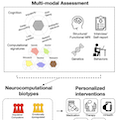Abstract
Revolutionary advances in neuroscience and genetics over the past two decades have provided unprecedented opportunities for increasing our understanding of the etiology and pathogenesis of psychiatric disorders. Despite these advances, the translation of this knowledge into clinical practice has been hindered by the significant heterogeneity within disorders and the neurobiologically-imprecise categorization of patients. Traditional diagnostic categories do not capture the underlying neurobiological processes and etiological mechanisms of psychiatric disorders and cannot adequately inform prognosis and treatment. To address this gap, the National Institute on Mental Health (NIMH) has proposed an alternative research framework based on Research Domain Criteria (RDoC), which yields psychiatric classification grounded on discoveries from neuroscience and genomics. Recently, the RDoC approach has been adapted for the study of addictions with the Addictions Neuroclinical Assessment (ANA) framework (1), which proposes that the assessment of addictions should cover multiple systems and focus on three key neurofunctional domains: Executive Function, Incentive Salience, and Negative Emotionality. Building upon the aims of the RDoC framework, a new field of “precision psychiatry” has emerged, considered to be a paradigm shift in psychiatry. Both the RDoC framework and precision psychiatry are predicated on precise measurement, which has necessitated the development of novel analytic approaches for classification and novel dimensional tools for phenotyping that can identify the unique mechanisms of psychiatric disorders at an individual level.
In this chapter, we make the case that theory-driven and data-driven computational approaches have enormous potential for increasing the precision and reliability of measurement, and the accuracy of diagnosis and prognosis in psychiatry. We review three types of computational approaches and their utility for precision psychiatry: (1) Theory-driven approaches, such as computational modeling; (2) Data-driven approaches, using various machine learning methods; and (3) Hybrid approaches, such as joint modeling and adaptive design optimization. We focus more narrowly on the application of these approaches to substance use disorders (SUD), where we attempt to map them on the current RDoC framework for addictions.
